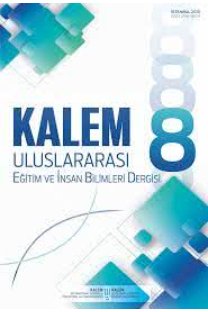Danışanların Beklentilerine Göre Etkili Psikolojik Danışmanların 15 Özelliği
The 15 Qualities of Effective Counselors to Expectations of Clients
___
- Akbaş, S. (2001). İlköğretim ve ortaöğretim okullarındaki rehberlik hizmetlerinin yürütülmesinde oluşturulan işbirliğin incelenmesi (Adana örneği). Yayınlanmamış yüksek lisans tezi, Çukurova Üniversitesi, Sosyal Bilimler Enstitüsü.
- Ali, B. S., Rahbar, M. H., Naeem, S. ve Gul, A. (2003). The effectiveness of counseling on anxiety and depression by minimally trained counselors: A randomized controlled trial. American Journal of Psychotherapy, 57(3), 324-336.
- Arredondo-Dowd, P. M. ve Gonsalves, J. (1980). Preparing culturally effective counselors. Journal of Counseling & Development, 58(10), 657-661.
- Bowker, L. H. ve Maurer, L. (1987). The effectiveness of counseling services utilized by battered women. Women & Therapy, 5(4), 65-82.
- Brott, P. (2006). Counselor education accountability: Training the effective professional school counselor. Professional School Counseling, 10(2), 179-188.
- Carkhuff, R. (2011). 21. yüzyılda yardım etme sanatı. (R. Karaca ve F. E. İkiz, Çev.). Ankara: Nobel Yayınevi Basım Dağıtım. (Orijinal çalışma basım tarihi 2014.)
- Carkhuff, R. R. (2000). The art of helping in the 21st century. U.S.A.: Human Resource Development Press, Inc.
- Christensen, L. B., Johnson, R. B. ve Turner, L. A. (2007). Araştırma yöntemleri desen ve analiz. (A. Aypay, Çev. Ed.). Ankara: Anı Yayıncılık. (Orijinal çalışma basım tarihi 2015.)
- Cresswell, J. W. (2007). Qualitative inquiry and research design. London: Sage.
- Corey, G. (2013). Theory and Practice of Counseling and Psychotherapy (9th edition). California: Brooks/Cole.
- Cormier, W. H. ve Cormier, L. S. (1991). Interviewing strategies for helpers (3. baskı). Pacific Grove, California: Brooks/Cole Publishing Company.
- Cormier, S. ve Hackney, H. (2008). Counseling strategies and interventions (7. baskı). Boston: Pearson Education Inc.
- Dwyer, S. C., Piquette, N., Buckle, J. L. ve McCaslin, E. (2013). Women gamblers write a voice: Exploring journaling as an effective counseling and research tool. Journal of Groups in Addiction & Recovery, 8(1), 36-50.
- Egan, G. (2011). Psikolojik danışmaya giriş. (Ö. Yüksel, Çev.). Ankara: Nobel Yayıncılık. (Orijinal çalışma basım tarihi 1975.)
- Emmerson, G. (2006). Advanced skills and interventions in therapeutic counseling. Carmarthen: Crown House.
- Eryılmaz, A. (2016). Psikolojik sorunlara müdahale ve kendi kendine yardım. Ankara: Pegem.
- Eryılmaz, A. (2018). Effectiveness of the multi-dimensional individual counseling intervention model to common psychological problems for non-clinical sample. Online Journal of Counseling & Education, 7(1), 1-18.
- Eryılmaz, A. ve Mutlu, T. (2016). Kuramdan uygulamaya bireyle psikolojik danışma. Ankara: Anı Yayıncılık.
- Eryılmaz, A. ve Mutlu, T. (2017). Developing the four-stage supervision model for counselor trainees. Educational Sciences: Theory and Practice, 17(2), 597-629.
- Eryılmaz, A. ve Mutlu, T. (2018). Gelişimsel kapsamlı süpervizyon modeline ilişkin psikolojik danışman adaylarının görüşlerinin incelenmesi. Elektronik Sosyal Bilimler Dergisi, 17(65), 123-141.
- Gladding, S. T. (2000). Counseling; a comprehensive profession. New Jersey: Prentice Hall.
- Jackson, M. ve Thompson, C. L. (1971). Effective counselor: Characteristics and attitudes. Journal of Counseling Psychology, 18(3), 249-254.
- Jones, W. P. ve Markos, P. A. (1997). Client rating of counselor effectiveness: A call for caution. Journal of Applied Rehabilitation Counseling, 28, 23-28.
- Hall, A. S. ve Torres, I. (2002). Partnerships in preventing adolescent stress: Increasing self esteem, coping, and support through effective counseling. Journal of Mental Health Counseling, 24(2), 97-109.
- Hutchins, D. E. (1979). Systematic counseling: The T-F-A model for counselor intervention. Journal of Counseling & Development, 57(10), 529-531.
- İkiz, E. F. ve Totan, T. (2014). Etkili psikolojik danışman niteliklerinin değerlendirilmesine yönelik ölçek geliştirme çalışması. Türk Psikolojik Danışma ve Rehberlik Dergisi, 5(42), 269-279.
- Kepçeoğlu, M. (1994). Psikolojik danışma ve rehberlik. Ankara: Özerler Matbaası.
- Kuzgun, Y. (2000). Rehberlik ve psikolojik danışma. Ankara: Yüksek Öğretim Kurumu.
- Lambert, M. J. ve Cattani-Thompson, K. (1996). Current findings regarding the effectiveness of counseling: Implications for practice. Journal of Counseling & Development, 74(6), 601-608.
- Lee, W. M. ve Mixson, R. J. (1995). Asian and Caucasian client perceptions of the effectiveness of counseling. Journal of Multicultural Counseling and Development, 23(1), 48-56.
- Merriam, S. B. (2009). Qualitative Research: A guide to design and interpretation. San Francisco: Jos-sey-Bass.
- McCrae, R. R. ve Costa, P. T. (2003). Personality in adulthood: A five-factor theory perspective. Guilford Press: New York.
- Owen, K. F., Owen, W. D. ve Ballestero, V. (2009). Counselors and administrators: The collaborative alliance in three countries. Eurasian Journal of Educational Research, 36, 23-38.
- Özabacı, N., Sakarya, N. ve Doğan, M. (2008). Okul müdürlerinin okuldaki psikolojik danışma ve rehberlik hizmetlerine ilişkin görüşlerinin değerlendirilmesi. Balıkesir Üniversitesi Sosyal Bilimler Enstitüsü Dergisi, 11(19), 8-22.
- Özgüven, İ. E. (2001). Çağdaş eğitimde psikolojik danışma ve rehberlik. Ankara: Pdrem Yayınları.
- Peseschkian, N. (1997). Positive psychotherapy: Theory and practice. Fischer TB: Frankfurt.
- Roeschle, J. G. ve Nix, S. (2009). A solution-focused leadership model: Examining perceptions of effective counselor leadership. Journal of School Counseling, 7(5), 1-21.
- Rogers, C. R. (1957). The necessary and sufficient conditions of therapeutic personality change. Journal of Consulting Psychology, 21(2), 95-103.
- Soygüt, G. ve Işıklı, S. (2008). Terapötik ittifakın değerlendirilmesi: Terapötik İttifak Ölçeği’nin güvenilirlik ve geçerlik çalışması. Türk Psikiyatri Dergisi, 19(4), 398-408.
- Tuzgöl-Dost, M. ve Keklik, İ. (2012). Alanda çalışanların gözünden psikolojik danışma ve rehberlik alanının sorunları. Mehmet Akif Ersoy Üniversitesi Eğitim Fakültesi Dergisi, 23, 389-407.
- Wampold, B. E., (2011). Qualities and actions of effective therapists. American Psychological Association, Series I-Systems of Psychotherapy, https://www.apa.org/education/ce/effective-therapists.pdf.
- Yaka, B. (2013). Mikro Beceri Eğitimi Programı’nın psikolojik danışman adaylarının psikolojik danışma becerilerine etkisi. Ege Eğitim Dergisi, 14(2), 1-24.
- Yeşilyaprak, B. (2001). Eğitimde rehberlik hizmetleri. Ankara: Nobel Yayın.
- ISSN: 2146-5606
- Yayın Aralığı: 2
- Başlangıç: 2011
- Yayıncı: Kalem Vakfı Okulları
Derya ÇIKILI SOYLU, Deniz DAĞSEVEN EMECEN, Ahmet YIKMIŞ
Üniversite Öğrencilerinin Depresyon Düzeylerinin Ruminasyon ve Problem Çözme Becerileriyle İlişkisi
Meltem YILDIZ, Jale ELDELEKLİOĞLU
Psikolojik Danışma Sürecinde Yeni Bir Model: Macera Terapisi
Asiye Büşra ŞİRİN AYVA, Azize Nilgün CANEL
Bağımsız Yaşama Güvenli Bir Adım: Gelişimsel Yetersizliği Olan Bireyler İçin Güvenlik Becerileri
Yasemin ERGENEKON, Aysun ÇOLAK
